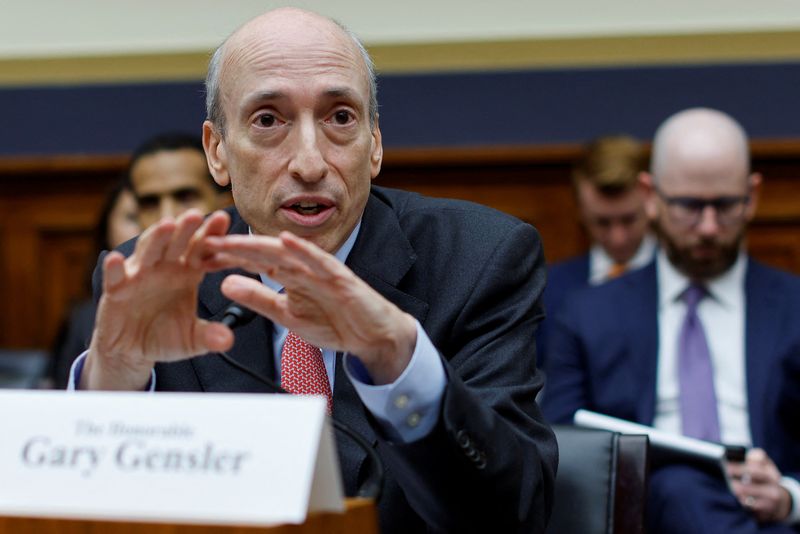By Douglas Gillison
WASHINGTON (Reuters) – U.S. Securities and Exchange Commission Chair Gary Gensler will step down on Jan. 20 when President-elect Donald Trump’s administration takes over, the agency said on Thursday, ending an ambitious tenure that saw him clash with Wall Street and the crypto industry.
“I thank President Biden for entrusting me with this incredible responsibility. The SEC has met our mission and enforced the law without fear or favor,” Gensler, who was nominated by Democratic President Joe Biden in 2021, said in a statement.
Known for his hard-charging style, Gensler led an ambitious agenda to boost transparency, reduce systemic risks, and stamp out conflicts of interest on Wall Street, completing dozens of new rules, some of which have been challenged in court.
Among his major accomplishments were changes to boost the resilience and efficiency of U.S. markets, including speeding up trade settlements and overhauling the $28 trillion Treasuries market, as well as a number of rules boosting investor disclosures and corporate governance.
The Baltimore native also successfully implemented rules mandated by Congress imposing SEC oversight on auditors of U.S.-listed Chinese companies, ending a decade-long tussle with Beijing that lawmakers said had put U.S. investors at risk.
On the enforcement front, Gensler’s SEC broke new ground with a multi-year effort focused on Wall Street’s use of text, WhatsApp and other unauthorized channels to discuss business, levying more than $2 billion in fines against dozens of firms, including JP Morgan and Goldman Sachs.
He also took on the crypto industry, suing Coinbase (NASDAQ:), Kraken, Binance and others, alleging that their failure to register with the agency violated SEC rules, accusations the companies deny and are fighting in court. When it comes to crypto, the courts have mostly backed Gensler’s positions.

But his sweeping agenda and uncompromising posture sparked intense pushback from Wall Street, as well as congressional Republicans, and even some Democrats.
The U.S. Chamber of Commerce, Managed Funds Association and other groups sued in the conservative-leaning Fifth U.S. Circuit Court of Appeals and elsewhere to overturn at least eight rules, arguing they were unjustified, harmful or beyond the SEC’s authority.

